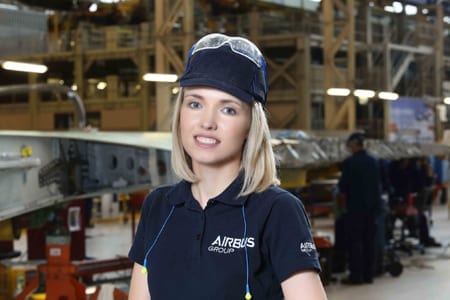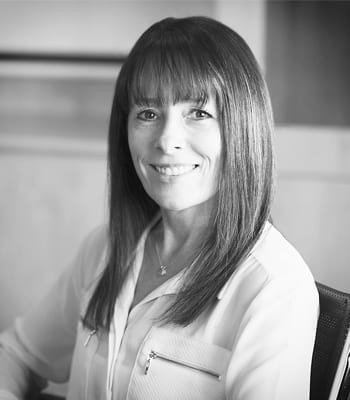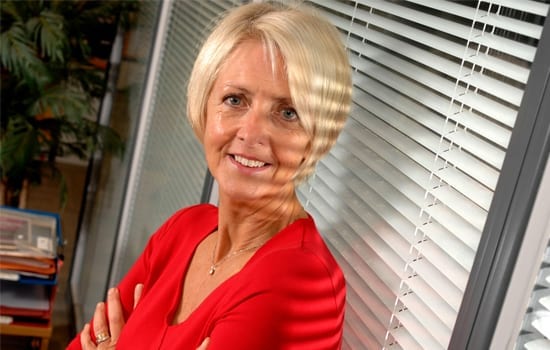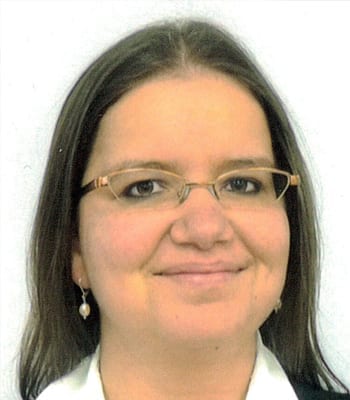
Devon Sumner is Head of Configuration and Product Development at the Airbus Wing Manufacturing Plant at Broughton, North Wales.
What first attracted you to engineering?
After A-levels I pursued a degree in Product Design but, after just over a year and half, I made the decision to leave university and consider other options, one of which was an Apprenticeship. My fascination with Aerospace attracted me to the Airbus Undergraduate Engineering Programme.
Would you identify any particular hurdles or challenges you had to overcome?
The biggest was overcoming the doubt about the decision I was making; not only to pursue an apprenticeship but to pursue a career in a male-dominated environment. There were people who thought I was making a big mistake. The second was having the confidence to believe that I could not only survive, but thrive.
If you had your time over again, would you go the same way?
I don’t regret taking the apprenticeship route; it opened a whole number of opportunities for me and allowed me to achieve a lot in a short space of time. I was able to combine theoretical learning with invaluable on-the-job experience, achieve a wide number of qualifications including a first class Engineering degree. I’m now responsible for configuration and product development at the Airbus Wing manufacturing plant in Broughton, North Wales.
What projects are you working on now?
My team and I are accountable for the end-to-end management of design modifications to Airbus wings, which can be driven by factors including cost reduction, quality improvements and continued Airworthiness. Are there any particular tips you would share with young women still at school and considering their career options? Pursue something you love and are passionate about but don’t assume University is the only option. Spend time researching different career paths; don’t be put off by “male dominated” roles.
And are there any you would share with employers?
Utilise existing female ambassadors to promote careers within their organisation.

ANDREA HOUGH OBE BOUGHT AT ENGINE CONTROLS WITH A BUSINESS PARTNER FROM ITS FORMER PARENT IN 2004. SHE IS NOW OUTRIGHT OWNER AND CEO
 What was it first attracted you to engineering?
What was it first attracted you to engineering?
I started at the company at 16 and had the opportunity to move around the departments during my training, covering everything from IT, planning, procurement, shop supervision to operations management. I found the whole business interesting and exciting.
Would you identify any particular hurdles or challenges you had to overcome?
Some of the manufacturing sites had never had a female manager before and some of them found it hard to adjust to a different style of management.
You followed the apprenticeship route. Was that a ‘conscious decision’ or force of circumstances?
I did an ONC, HNC and DMS in business and management during my 6 years of training. It is the best way to learn about a business and its products, customers and allows you to get to know how to deal with and manage people from all walks of life.
What projects are you working on now? We have recently implemented a program of 5S and are embarking on achieving our ISO18001 and ISO14001 accreditations to enable us to win business from new customers in the Defence market.
Are there any particular tips you would share with young women still at school and considering their career options? I would recommend attending local career fairs and open days in the manufacturing sector. They will be surprised at the scope of some of the jobs available – which don’t necessarily include going to University.

JAN WARD CBE IS CEO OF CORROTHERM INTERNATIONAL LTD, WHICH SHE STARTED IN SEPTEMBER 1992. SHE ALSO HOLDS A NUMBER OF NON EXECUTIVE DIRECTOR POSITIONS.
What was it first attracted you to engineering?
I was attracted by the technical aspects and the logical nature of engineering. It’s also quite creative as you have to have a mind that wants to solve problems. I also love learning; I liked the sense of achievement when you get something right.
Would you identify any particular hurdles or challenges you had to overcome?
Not being taken seriously was an issue, which got easier with time as I learned more and earned my stripes. You need to be determined and don’t take any notice of being told you can’t do something.
How did you get your qualifications?
It took me five years to get my BSc Mech Eng. I was working through part of it and I also had a family. I would absolutely go the same way again, but I would have liked to start earlier.
What projects are you working on now?
I’m currently following closely the developments in additive manufacturing, and a new method of producing nanoparticles.
Are there any particular tips you would share with young women still at school and considering their career options?
Be open minded about what an engineering career is. There are specialisations in manufacturing, construction, energy, renewables, power – to name but a few. Look at job descriptions in vacancy ads to see what types of jobs there are. Schools generally do not have this as a priority on their career list, for girls or boys, so try to get independent advice from an engineer in the discipline that attracts you.
And are there any you would share with employers?
Encourage girls at school and college by engaging with them; they will be missing out on a talent pool if they don’t.
NADINE STETCH; SENIOR CONTROL DESIGN ENGINEER, BLATCHFORD. PROJECT CHAMPION OF THE LINX MICROPROCESSOR-CONTROLLED LOWER LIMB PROSTHESIS, WHICH WON THE MACROBERT AWARD FROM THE ROYAL ACADEMY OF ENGINEERING IN 2016.
What was it first attracted you to engineering?
Engineering is about applying science in a meaningful way. You take principles of how things work and then apply them to reality.
Would you identify any particular hurdles or challenges you had to overcome?
The field is still male-dominated but it is getting better. Studying engineering can be challenging as it requires a multi-disciplinary knowledge. It is important to be persistent and keep on going.
You followed the Degree route. Was that a ‘conscious decision’ or was it force of circumstances?
Initially I studied Engineering Cybernetics. I did an internship at Blatchford and was offered a permanent role afterwards. I have recently finished my PhD in Biomedical Engineering.
What projects are you working on now?
I’m currently working on the MovAiD Horizon2020 project that investigates factories of the future, industry 4.0 and additive manufacturing for customised movement assistive devices. I’m also working on the next evolution of the Linx integrated limb.
Are there any particular tips you would share with young women still at school and considering their career options?
Get experience in the industry to see if you enjoy it. Be open and explore any opportunity: be it a career talk at school, a volunteering opportunity, a career fair, work shadowing or internship.
And are there any you would share with employers?
The skill set and potential of the individual person matters. In many organisations there is still the famous “glass ceiling” for women, even if unintentional. It is important to reflect on that status openly and take action if necessary.

